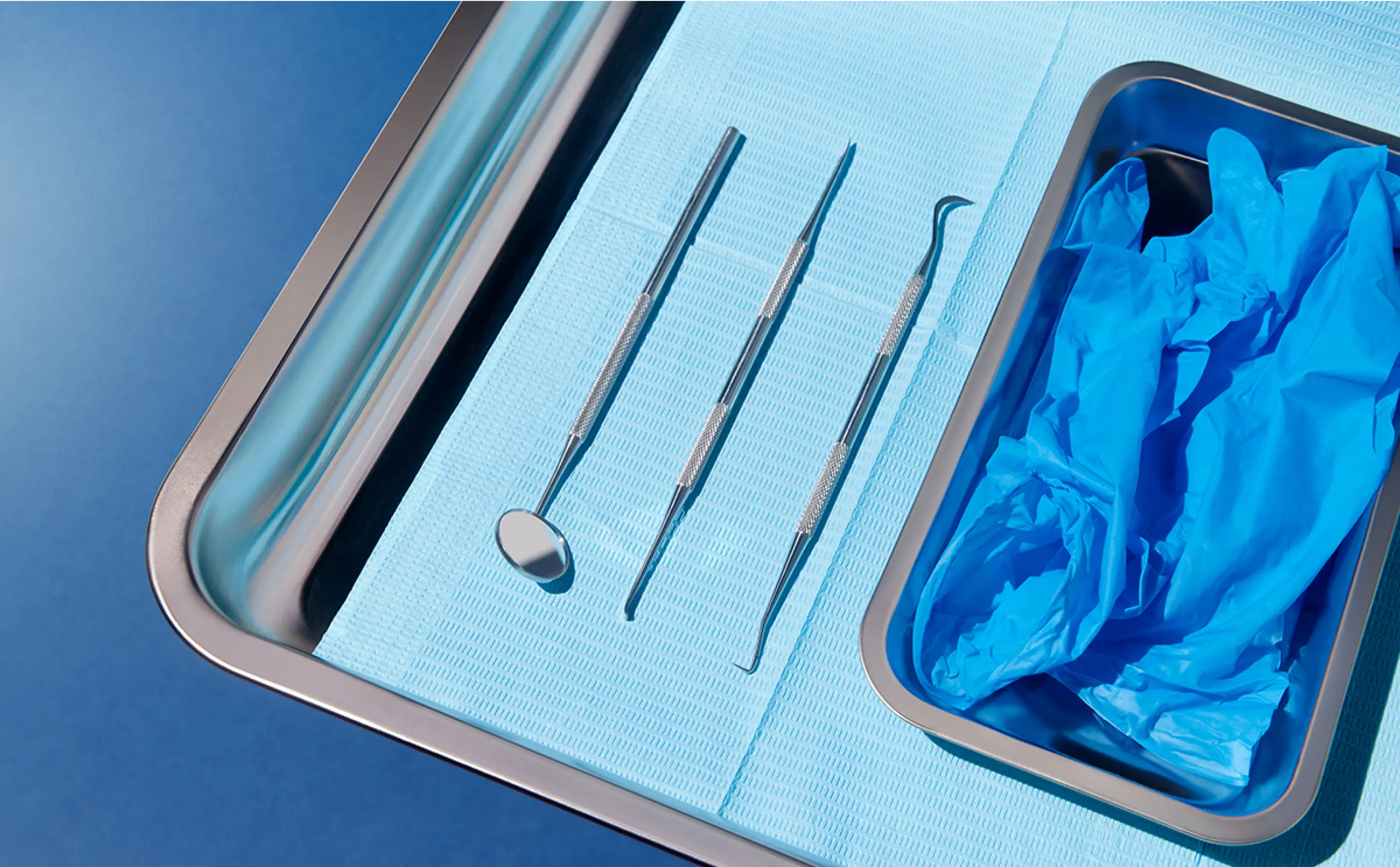ARESTIN® is the only antibiotic that helps fight gum disease at the site of infection.
ARESTIN is used in combination with scaling and root planing (SRP) procedures to treat patients with adult periodontitis (gum disease). ARESTIN may be used as part of an overall oral health program that includes good brushing and flossing habits and SRP.
The stages
of gum disease
Gum pockets can signal gum disease
Gum pockets occur when gum tissue begins to detach from teeth.
A gum pocket of 4 mm or more may signal gum disease. Pockets tend to get deeper and more numerous as gum disease worsens, putting teeth at risk.


Gum disease may be associated with increased risk for other chronic conditions throughout the body such as cardiovascular disease. These diseases may also lead to higher risk of gum disease.
That is why it's important to speak with your dental professional about gum disease and how they can help with your overall oral health care plan.

Treatment can reduce gum pockets
Successful treatment can improve gum health and better support your teeth.
When treatment is working, your dental professional may notice reduced swelling and bleeding, as well as a reduction in gum pocket depth. Your gum tissue may be more snug around your teeth.
About ARESTINFighting gum disease takes time
But with consistent treatment, and effective home care, your dental professional may be able to notice these gradual improvements:
- Gum pocket depth that’s improved
- Pockets that have not gotten deeper
- Less gum bleeding and swelling when touched
ARESTIN is used in combination with scaling and root planing (SRP) procedures to treat patients with adult periodontitis (gum disease). ARESTIN may be used as part of an overall oral health program that includes good brushing and flossing habits and SRP. Do not take ARESTIN if you are allergic to minocycline or tetracyclines. Ask your dentist if you are not sure.

What is scaling and root planing (SRP)?
Scaling is the manual removal of plaque and tartar from teeth and their roots.
Planing smoothes out rough spots on the roots where bacteria can gather.
Is it effective?
Scaling and root planing (SRP) is a widely used gum disease treatment. But it has its limits.
SRP is highly effective. But even the best hygienists and dentists can only do so much, since dental instruments cannot always reach every point of infection.
That’s why many dental professionals now combine SRP with an antibiotic that’s applied at the site of infection, like ARESTIN (minocycline HCl) Microspheres, 1mg.
In fact, ARESTIN + SRP is proven to deliver better results than SRP alone.
About ARESTINTips for healthier gums
Get the gum disease treatment your dental professional recommends as soon as possible.
The goal is to decrease gum pockets (reduce infection) and continue to support gums that heal over time.
- Brush twice daily with fluoride toothpaste
- Floss every day
- Replace toothbrush every 3-4 months (or if bristles fray)
- Fluoride toothpaste with the American Dental Association seal
- Soft bristle toothbrush (gentler on enamel and gums)
- Electric toothbrush
- Dental floss holders (can make flossing easier)
- Interdental brushes to clean hard-to-reach areas
Fluoridated tap water or bottled water helps improve gum health.
Smoking can increase the risk of gum disease, tooth decay, and tooth loss.
If you’re a smoker, consider quitting.

Get started with treatment
Talk to your dentist and ask if ARESTIN is right for you.
You may be eligible for a co-pay as low as $0.*
Learn more.

$0* Co-pay
ARESTIN may be covered by your private commercial medical insurance, whether your dental insurance covers it or not.
Have your info ready
Have your medical insurance card handy. Your dentist’s office will need your information.
This may be different from your dental insurance coverage. You’ll also be asked to sign a prescription form before leaving the office.
Know your coverage
Your dental office can help determine if your medical insurance plan provides coverage for ARESTIN.
If your insurance doesn’t cover ARESTIN, you can discuss other options that might make paying for your prescription easier
*ARESTIN Bausch Health Companies Inc.
This offer is only valid for patients with private commercial insurance, where ARESTIN (minocycline HCI) microspheres, 1 mg is a covered medication. This offer is not valid for any person eligible for reimbursement of prescriptions, in whole or in part, by any federal, state, or other governmental programs, including, but not limited to, Medicare (including Medicare Advantage and Part A, B, and D plans), Medicaid, TRICARE, Veterans Administration or Department of Defense health coverage, CHAMPUS, the Puerto Rico Government Health Insurance Plan or any other federal or state health care programs. You agree not to seek reimbursement for all or any part of the benefit received through this offer and are responsible for making any required reports of your use of this offer to any insurer or other third party who pays any part of the prescription filled. Offer good only in the United States through the ARESTIN Rx Access® program. This offer is not valid where otherwise prohibited by law, taxed, or otherwise restricted. This offer is not valid with other offers. The coupon has no cash value. No cash back. This benefit can be used only for an ARESTIN prescription filled by Accredo Health specialty pharmacy and dispensed to the dental office on behalf of the patient as authorized below. You must be 18 years of age or older to redeem this offer for yourself or a minor. This offer cannot be redeemed at government-subsidized clinics. This offer is only valid on one prescription fill of ARESTIN. The maximum benefit available is $1,500 per prescription fill. You are responsible for all additional costs and expenses after the maximum benefit is reached. If you receive coverage through a health savings account (HSA) or similar arrangement, it is your responsibility to know how claims are processed and understand that amounts paid by the third party for your ARESTIN prescription may be deducted from your benefits limit automatically. This offer is not health insurance. This offer expires on December 31, 2024. Bausch Health US, LLC reserves the right to rescind, revoke, terminate, or amend this offer at any time, without notice.
Questions?
We’re here to help.
Contact our Customer Care team at 1-866-273-7846.
Contact our Customer Care team at 1-866-273-7846.
Monday - Friday, 8:30 am - 5:00 pm ET
You’re encouraged to report negative side effects of prescription drugs to the FDA. Visit www.fda.gov/medwatch or call 1-800-FDA-1088.
You’re encouraged to report negative side effects of prescription drugs to the FDA. Visit www.fda.gov/medwatch or call 1-800-FDA-1088.
What is ARESTIN?
What is ARESTIN?
ARESTIN® (minocycline HCl) Microspheres, 1mg is used in combination with scaling and root planing (SRP) procedures to treat patients with adult periodontitis (gum disease). ARESTIN® may be used as part of an overall oral health program that includes good brushing and flossing habits and SRP.
IMPORTANT SAFETY INFORMATION
- Do not use ARESTIN if you are allergic to minocycline or tetracyclines, ask your dentist if you are not sure. Do not use ARESTIN in children, pregnant or nursing women as the use of tetracycline class drugs, including ARESTIN, during tooth development may cause permanent discoloration of the teeth.
- ARESTIN may cause you to be sensitive to sunlight. Patients exposed to direct sunlight or ultraviolet light may develop a severe sunburn. At the first evidence of skin redness, call your dentist.
- Serious allergic reactions have occurred with oral minocycline. Get emergency help right away if you experience any signs of an allergic reaction including shortness of breath, swelling of the face, throat and tongue, rash, hives, itching, fever, or enlarged lymph nodes.
- Tetracyclines, including oral minocycline, have been associated with the development of autoimmune syndromes with symptoms such as joint pain, muscle pain, rash, swelling, fever, enlarged lymph nodes, and general body weakness.
- Tell your dentist about all the medicines you take, and about any health problems you have, including if you’ve had oral candidiasis (“thrush”).
- ARESTIN has not been studied in patients with weakened immune systems, such as patients with HIV infections or diabetes, or those receiving chemotherapy or radiation.
- The most frequently reported non-dental side effects were headache, infection, flu symptoms, and pain.
You are encouraged to report negative side effects of prescription drugs to the FDA. Visit www.fda.gov/medwatch or call 1-800-FDA-1088.
You are encouraged to report negative side effects of prescription drugs to the FDA. Visit www.fda.gov/medwatch or call 1-800-FDA-1088.
Please see full Prescribing Information here
What is ARESTIN?
ARESTIN® (minocycline HCl) Microspheres, 1mg is used in combination with scaling and root planing (SRP) procedures to treat patients with adult periodontitis (gum disease). ARESTIN® may be used as part of an overall oral health program that includes good brushing and flossing habits and SRP.














